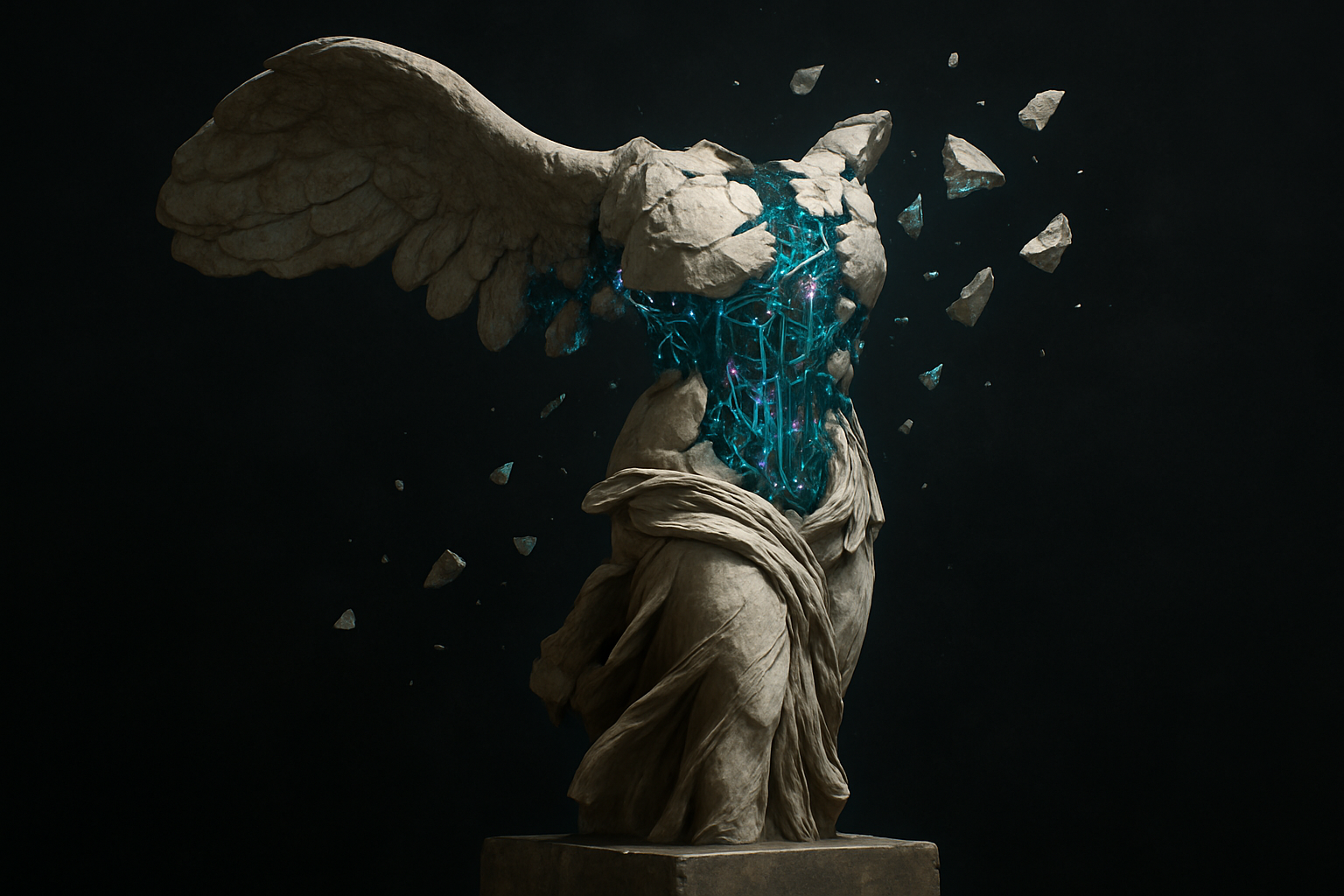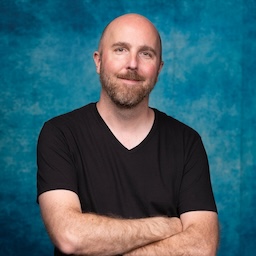
 John Moravec
John MoravecQuestion everything
In our era defined by radical uncertainty, a primary duty of education should be to develop our courage to question relentlessly. Otherwise, we will never learn. We must go beyond merely interrogating the facts presented to us or the authorities that deliver them. It demands that we scrutinize everything, especially including our most fundamental beliefs, the frameworks we rely on, and critically, our own roles within these constructs. Without such introspect, education risks becoming a tool of conformity rather than a catalyst for insight.
We find ourselves at a pivotal crossroads, caught between systemic collapse and unprecedented possibility. The rise of artificial intelligence challenges the very nature of knowledge itself, pushing us to reconsider what it means to be human, what capacities are uniquely ours, and how we define intelligence and creativity. Simultaneously, the accelerating pace of climate breakdown tears apart long-held certainties, exposing the inadequacy of traditional models and demanding adaptive thinking that transcends outdated paradigms.
Amid these upheavals, political landscapes across the globe are hardening into rigid authoritarian regimes, where conformity is enforced and dissent is met with repression. In such environments, education systems that reward obedience and suppress critical thinking become complicit in maintaining oppression. To educate in this context by fostering passive acceptance will lead to negative consequences, as it undermines the very agency necessary for individuals and societies to navigate and survive profound transformation.
We have no time for schooling systems disguised as achievement factories that churn out replicas of the status quo. Manifesto 25 provokes us:
Question everything. Start with this manifesto. Blind acceptance breeds complacency. As co-learners, we must provide safe spaces to critically evaluate all ideas, including the ones presented here. By contributing to a culture of critical thinking and open dialogue, the development of one’s self-awareness is encouraged and individuals are enabled to contribute toward a continuous evolution of how we teach and learn.
Mainstream educational institutions operate as engines of standardization. They applaud quiet agreement and punish the boldness of disruption. Doubt becomes an enemy, difference a liability. Under the banner of consistency, we erase the beauty of individual uniqueness. In pursuit of uniform excellence, we flatten diversity. This silent pact to stop questioning is how systems preserve their power.
The act of questioning is never purely intellectual; it demands emotional bravery. To challenge our deepest beliefs, and to expose the fragile ground beneath our assumptions, is to face uncertainty in its rawest form. This is why the manifesto insists on safe spaces for critical evaluation: because true questioning unfolds within relationships of trust and vulnerability. The courage to question grows not only from reason but from feelings: doubt, discomfort, fear, and sometimes grief. Education must support this embodied process, recognizing that intellectual freedom is inseparable from emotional resilience and communal care. Self-awareness emerges when we learn to hold complexity in our hearts as well as our minds.
But education, fundamentally, should not be about maintaining the status quo; it should about enabling the creation of what could be. True creation, authentic transformation, is never frictionless. It requires tension, disagreement, and the courage to embrace uncertainty.
Question to unlearn
We must tear down education’s stifling walls and reconstruct it as a culture of bold inquiry. This demands making intentional room for discomfort, contradiction, and unresolved questions. We need learning environments brave enough to challenge conventional rules, dominant assumptions, and accepted truths. Together, students and educators must dismantle received wisdom, not merely to deconstruct but to reconstruct deeper, shared meanings.
To question is to embark on the demanding journey of unlearning. Education often reinforces assumptions, biases, and norms so deeply ingrained they become invisible. The manifesto challenges us to discard what no longer holds, but this discarding is neither swift nor easy. Unlearning requires deliberate effort, patience, and support to uproot internalized prejudices and outdated paradigms. It is a process of making space, clearing the mental and emotional clutter so that new, more expansive ways of knowing can emerge. This labor is vital for genuine critical inquiry and for the self-awareness that the manifesto celebrates. Without unlearning, questioning risks remaining superficial, trapped by the very structures it seeks to challenge.
Unlearning is a communal, iterative process. It requires collective support to dismantle ingrained biases and to resist the pull of comfortable narratives. Spaces of uncommon safety become critical arenas where individuals can confront internalized oppression and open pathways toward new, shared ways of knowing.
This endeavor is inherently political, profoundly uncomfortable, and essential. bell hooks reminds us that true education is liberation, an act of deliberate transgression. Paulo Freire taught us that learners must be empowered as active agents shaping their own knowledge, not passive recipients of someone else’s agenda. To educate critically is to reject intellectual domination and to affirm every individual’s right (and obligation) to interpret the world actively, critically, and collaboratively.
So, concretely, what does this vibrant culture of questioning look like?
Questioning breaks the mold of scripted learning. It erupts when people reclaim the power to redefine what and how they learn, moving away from being passive consumers toward co-creators of their own intellectual journeys. It demands educators shed the guise of certainty and instead stand alongside learners as fellow explorers, unafraid to expose doubts and wrestle with unknowns in full view.
This process is messy, raw, and unapologetic. It is highly political. It thrives where communities refuse silence around uncomfortable realities (i.e., race, power, history) not to settle for easy answers but to ignite honest reckoning and collective imagining. It fuels the capacity to see through manipulation, dismantle inherited myths, and craft new understandings that challenge the status quo.
Questioning everything is a radical, often risky act. It unsettles power, disrupts comfort, and threatens entrenched interests. The manifesto’s invitation to start by questioning itself is a profound gesture of humility, and an acknowledgment of the dangers inherent in intellectual openness. For learners and educators alike, the choice to question may mean facing resistance, exclusion, or worse. Recognizing this reality is not to deter inquiry but to call for resilience and solidarity. Safe spaces become not just places of comfort but zones of courageous defiance where questioning is sustained against social and political pressures. To educate critically, then, is to build communities that protect and empower those who dare to ask the hard questions.
Here, education is a living experiment in freedom, where minds break open and new possibilities take shape.
In lieu of conclusion …
This culture of inquiry toward improvement must include our own works, including Manifesto 25 itself. Question every claim presented here. Challenge its assumptions. Discard what proves inadequate. Remix ideas that resonate. Infuse it with your own lived experiences, fresh perspectives, and emerging insights. Start at the edges and then dive deep. Texts should never be treated as sacred or beyond reproach. They are snapshots, made with the best storytelling mechanisms available at the moment. Their true value lies in being contested, reshaped, and actively claimed by those eager to build a better world.
Questioning, after all, is fundamentally creative. It is an intellectual act, often politically charged, inevitably disruptive, and ultimately generative. Questioning prepares us for the unknown and enables us to step forward into new possibilities by disrupting inherited narratives and creating spaces for new stories that reflect diverse experiences and the future. This narrative transformation is both an act of liberation and a foundation for imagining and building alternative possibilities.
By questioning, we assert collective ownership of our shared futures. Ownership carries responsibility to collaboratively imagine, construct, and transform our world as active architects of what lies ahead. Our futures are not for others to design. They are ours.
Start by asking fiercer, sharper questions. Then collaboratively create answers worthy of them. Our futures await.
Let’s begin.

